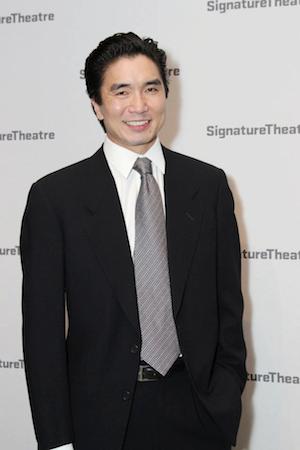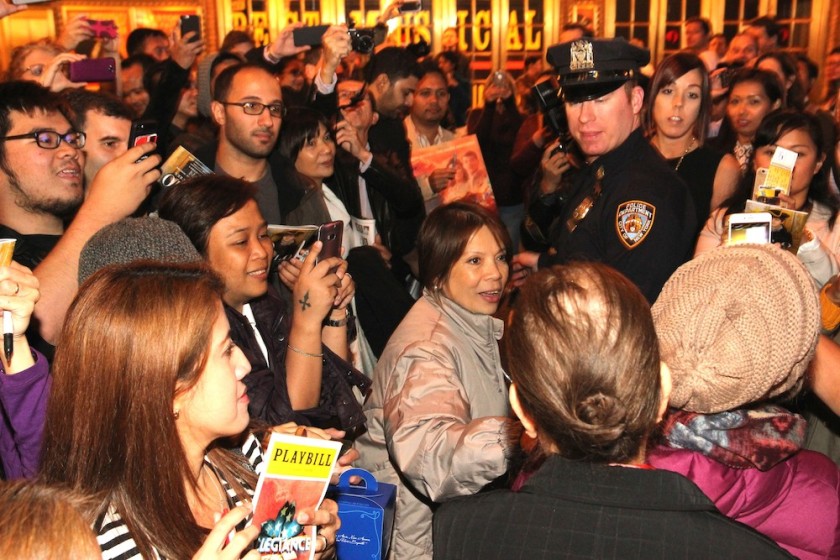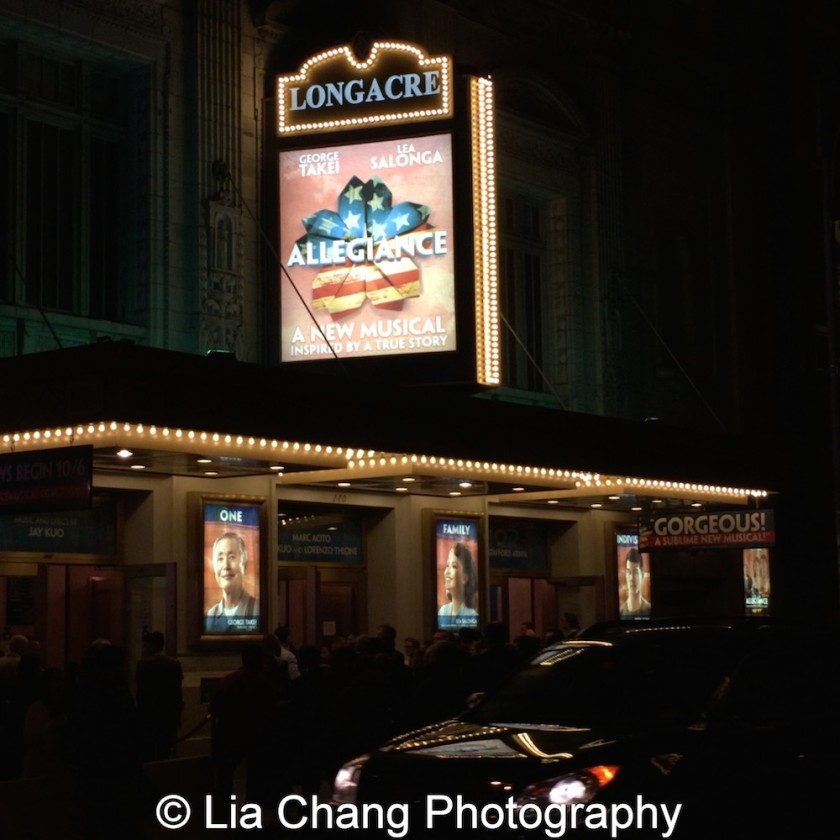By Lia Chang
AsAmNews Arts and Entertainment Reporter

I sat down to dinner with actor Greg Watanabe, who is currently making his Broadway debut as wartime Japanese American leader Mike Masaoka in the new musical Allegiance at the Longacre Theatre. Masaoka, was an American-born child of Japanese parents, who became the influential spokesman in Washington for the JACL (Japanese American Citizens’ League) throughout World War II. A key player in JACL’s decision to cooperate with the Japanese American internment during the war, Masaoka urged cooperation and opposed legal challenges to the government, and advised the government on how to run the camps. Many saw Masaoka, who was also an advocate of the segregation of so‑called “troublemakers,” as a controversial figure. He was instrumental in the creation of the all-Japanese American 442nd regimental combat unit of the U.S. Army.
Joining us was Frank Abe, the Seattle based filmmaker of Conscience and the Constitution, the landmark Independent Television Service documentary about 85 nisei internees at Heart Mountain, Wyoming. The men refused to be drafted to fight for the U.S. military without first having their constitutional rights restored.
Abe traveled from Seattle for the first preview of Allegiance on October 6th, and the pair met that night after the show. Abe had interviewed Masaoka and I thought it would prove invaluable for the pair to chat in a historical capacity. We met up at Sapporo’s a few days later during Watanabe’s dinner break from the show.
Allegiance stars Tony and Olivier Award winner Lea Salonga (Miss Saigon, Les Miserables) in her long-awaited return to Broadway joined by Star Trek icon George Takei in his Broadway debut at age 78, and Broadway and Glee star Telly Leung. Allegiance is the vibrant and unforgettable story of one family’s resilience in the face of seemingly-insurmountable odds, inspired by Takei’s real-life experience as a Japanese American during World War II, when anti-Japanese hysteria overtook the U.S. in the wake of Pearl Harbor.

Watanabe last appeared in New York in 2012, starring in Signature Theatre Company’s revival of David Henry Hwang’s Golden Child.
Below are excerpts from our conversation.


Chang: What’s it like to be back in New York and making your Broadway debut?
Watanabe: It’s been crazy. I’ve never been in a show with a star. It’s one thing when we do our curtain call and the stars come out and take their bows. But then the fans are waiting outside and the showering adulation is something that I am not used to. People who are not part of the community are going to come see this show – Trekkies, Lea’s fans who may or may not be aware of Japanese American history. There is a cross section of people who are going to be introduced to the story.

 Chang: How did you do your research to play Masaoka?
Chang: How did you do your research to play Masaoka?
Watanabe: It started with his autobiography, They call me Moses Masaoka: An American Saga. I had seen Conscience and Constitution before, so I rewatched that.
Frank Abe: You do a great job by the way.
Watanabe: My mom’s cousin, Stephen Sumida, is a professor of American Ethnic Studies at the University of Washington. I’ve had conversations with other people who had done other shows about the internment. That is always my entrée point to plays and art. I had a lot of interactions with different people in the community; a lot of it is conversational. That was important. I had a hard time finding a lot of stuff on Masaoka specifically.
 Allegiance has been in the works for awhile and joining the show at the last minute, I found to be kind of tricky. I wanted to feel out the lay of the land. What is going to be their take on it? I am a hired gun to play this part and I want to have as great an understanding of what it is I could be doing and representing. I did have a question as to why they chose to use his name versus everyone else being fictionalized. The conclusion that I came to is that he is a public figure. That’s fair game. Except as soon as you invoke his name and you have him speaking, you have an obligation to what it is that you present.
Allegiance has been in the works for awhile and joining the show at the last minute, I found to be kind of tricky. I wanted to feel out the lay of the land. What is going to be their take on it? I am a hired gun to play this part and I want to have as great an understanding of what it is I could be doing and representing. I did have a question as to why they chose to use his name versus everyone else being fictionalized. The conclusion that I came to is that he is a public figure. That’s fair game. Except as soon as you invoke his name and you have him speaking, you have an obligation to what it is that you present.

The JACL recently released a statement that applauded George Takei and his getting the story out in a fictionalized format with Allegiance. The JACL had a problem that they were mentioned by name, and that they name Masaoka in the show. The JACL is worried that people are going to mistake this for historical fact. They are encouraging people to go out and get actual historical information by going to the JACL website.
First of all, any kind of historical figure, whether you are talking about LBJ or FDR, they are public figures and there is historical fact and people are going to have different opinions. Like was FDR a racist? Did he actually believe that there was military necessity for internment? Those are points of debate and open to public discussion. That’s different than things that might be factually wrong. That is also up for debate if you are telling a fictionalized story.
I can’t be responsible for the final decisions that get made by the producers. I had to keep all of those things in mind when I am approaching what needs to get done. If they are taking words directly out of Masaoka’s mouth, or it was something that he wrote, the context of that is different. It’s fictionalized and theatricalized. I still have a job to do in terms of trying to imagine circumstances and what point it is that I am representing psychologically and emotionally. Because of that, I feel it is important that I internalize some of the context- like people getting interned, and what people endured. Even though I might need to steer more towards allowing that to be shown and exhibit something else, more of the facile showman.

Abe: As a student of Masaoka, I would regard the JACL statement as more a reflection of their denial of what Mike really did and the continuing inability to renounce his actions. It’s more their denial than a problem for the production. The production solves the problem by using Mike’s real words for the most part. Your portrayal is respectful, not a caricature, not a cartoon. View the JACL statement in that way and have confidence in your own portrayal of the words as written.
Chang: What generation are you?
Watanabe: Yonsei by my mom and Sansei by my dad. My mom’s side is from Hawaii; my dad’s side was at Heart Mountain. My dad was born in Denver because in ’44, they got work-released. I have an uncle that was in the 442nd. That’s how much separation there was between my dad being born, and the rest of his brothers and sisters, who were in their teens.

Chang: What does it mean to you to bring a show like this to Broadway given your family history?
Watanabe: Playing a Japanese American character and dealing with situations with material that is germane, not just incidental, has always been important to me.
One of the very first experiences that I had, early on in my career was being in Warren Kubota’s Webster Street Blues. It’s a play about Japanese Americans in J-town in San Francisco in the 70’s during the Vietnam War. It is a really great play and I had a great time. It was also the beginning of a long journey of self-awareness. I’d had experiences in college with other plays, Genny Lim’s Paper Angels, David Henry Hwang’s FOB. It was my awakening of Asian American political consciousness and identity. It was all through theater. That was always my entrée point into a greater understanding of historical events and cultural understanding.
To get to be here at this point, I’ll turn 48 when we open on November 8th, it feels amazing to be making my Broadway debut. If I had been doing anything else, a play that is perfectly lovely but I would have been playing some part that is not Asian American, not Japanese American, not about the Japanese incarceration camps, it wouldn’t have meant nearly as much. It means so much to be able to participate in this project. It’s unbelievable to me; gratifying and I feel so privileged to be a part of it. I feel so connected to the material and the subject matter. The history of it and what I know, when I watch things on stage, I understand that when those figures are dancing contemporary dance expression of their suffering, it really connects very strongly with me. I find it interesting to be playing this character because if I were to look back, I would not have been a big fan of him personally, but to be part of the play itself, and what it speaks too is very meaningful to me.
Chang: What are the differences between working on a straight play and a musical?
Watanabe: I had no idea how difficult it was to be in a musical. They don’t do any table work. We spent a little time talking about the character. We had a conversation. We don’t sit down and do scene work. I realized that they’ve got a lot of stuff to work on. My scenes are very short, exposition, monologues. I realized how much I missed being able to rehearse. To be able to ask questions and how much I tie motivation into being able to remember things. I’ve had to do a lot of that on my own and that is cool.
Chang:What do you hope audiences will take away?
Watanabe: I hope that they come away with a greater sense of emotional impact of the internment camp experience. I hope that they go back and read books that give them facts. That they read Michi Weglyn’s book, Years of Infamy: The Untold Story of America’s Concentration Camps. I hope that they come away with a greater sense of emotional impact of the internment camp experience. I hope that they go back and read books that give them facts. I hope that it sparks an interest because of the human emotional element that gets communicated. Art can do that, whether it is poetry, dance or films, it can find a way to communicate emotional experience and lived experience. There are so many stories and its so sad there’s the one Japanese American experience. And if you are going to talk about Asian American experience, there’s Flower Drum Song, that might be it. Many musicals are mainly from a white person’s perspective or an Asian perspective. I feel the weight of all of that. I hope that it is a first step of a continued process of understanding Asian Americans in the context of being American. Just the fact that we have Asian Americans on stage.


Watanabe has appeared in the world premiere productions of The Ballad of Yachiyo (Berkeley Repertory Theatre, Seattle Repertory Theatre, Public Theater-New York Shakespeare Festival), Butcher’s Burden (Asian American Theater Company); The Summer Moon (A Contemporary Theater, South Coast Repertory Theatre); 10,000 Years (written and produced by John Ridley); No-No Boy (adapted by Ken Narasaki); The Happy Ones (South Coast Rep.) for which he was nominated for an L.A. Drama Critics Circle Award for Best Featured Performance; Extraordinary Chambers (The Geffen Playhouse) for which he was nominated for an Ovation Award for Best Featured Actor in a Play; and as ‘DHH’ in Hwang’s Yellow Face at Mo’olelo Performing Arts Company for which he was nominated for a Craig Noel (San Diego Theater Critics Circle) award for Outstanding Lead Performance in a Play.

On television, he was a regular cast member of the UPN sketch comedy pilot Off Limits, appeared on 23 episodes of Watch Over Me (MyNetworkTV), and has guest starred on Curb Your Enthusiasm, Reno 911!, Criminal Minds, The Proud Family, Hidden Hills, J.A.G., and Nash Bridges. Watanabe has appeared in the films Only The Brave, Lane Nishikawa’s drama about the 100th Infantry Battalion/442nd Regimental Combat Team, Americanese, True Love and Mimosa Tea, Life Tastes Good, and Forgotten Valor. Watanabe has been a company member of the Asian American sketch comedy troupe, the 18 Mighty Mountain Warriors since 1994. The documentary about them, ‘Mighty Warriors of Comedy’ won a Northern California Emmy.

Allegiance features a book by Marc Acito and music and lyrics by Jay Kuo. Olivier Award nominee Stafford Arima (London’s Ragtime, Off-Broadway’s Bare, Carrie, Altar Boyz) directs.
The cast of Allegiance also includes Michael K. Lee, Christopheren Nomura, Katie Rose Clarke, Aaron J. Albano, Belinda Allyn, Marcus Choi, Janelle Dote, Dan Horn, Owen Johnston, Darren Lee, Kevin Munhall, Manna Nichols, Rumi Oyama, Catherine Ricafort, Momoko Sugai, Sam Tanabe, Elena Wang, Scott Watanabe and Scott Wise.
Allegiance has implemented a digital lottery for $39 seats available each day via allegiancemusical.com/lottery. Entries can be submitted the day of the preferred performance, either by 11AM for matinees or 3PM for evening performances. Winners will be notified via email or text, depending on what they select during the entry process, and winners may purchase up to 2 tickets which will be held at the box office. Allegiance will also offer a limited number of $39 rush tickets for patrons 35 years old and under for each performance beginning at the opening of the box office each day. There will be a limit of 2 tickets per customer. Cash or credit cards will be accepted for all lottery and rush tickets, and seat locations will vary depending on availability.
Allegiance had its world premiere in a record-breaking engagement at the Old Globe Theatre in San Diego in 2012.
Click here to purchase tickets. For more information go to www.AllegianceMusical.com.

Lia Chang is an award-winning filmmaker, a Best Actress nominee, a photographer, and an award-winning multi-platform journalist. Lia has appeared in the films Wolf, New Jack City, A Kiss Before Dying, King of New York, Big Trouble in Little China, The Last Dragon, Taxman and Hide and Seek. She is profiled in FebOne1960.com Blog, Jade Magazine and Playbill.com.




